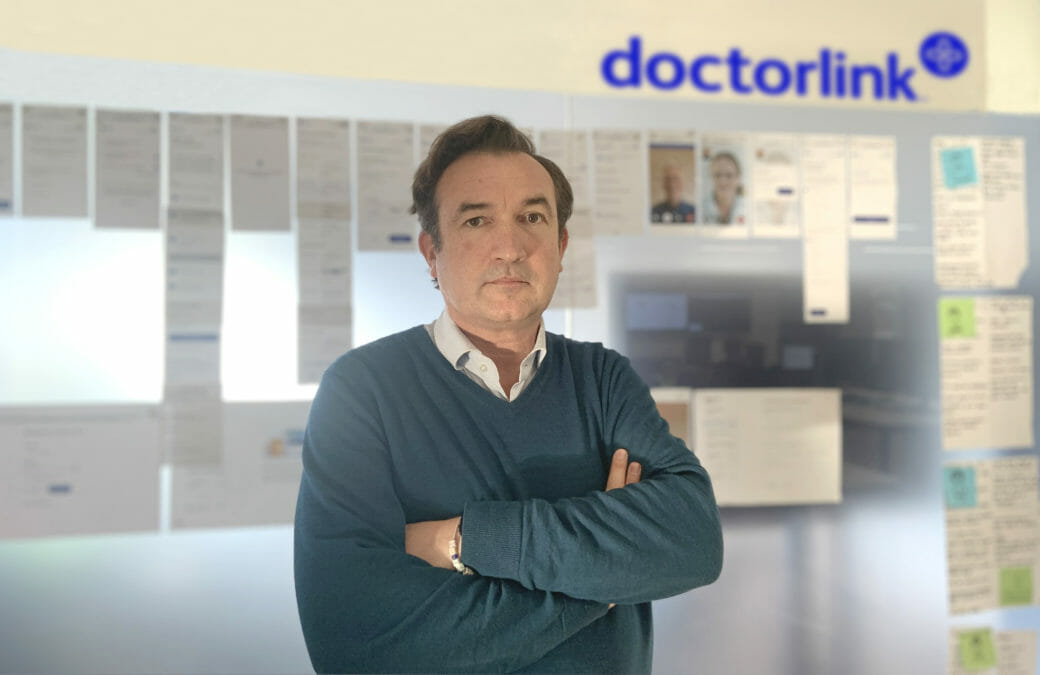1. Tell us about Doctorlink?
Doctorlink is the UK’s leading online Symptom Assessment provider to the NHS, offering instant digital triage and video and phone consultations with the patient’s own NHS GP.
Even prior to coronavirus, practices using the service were able to redirect around one in five patients to a more appropriate service for their needs, often a pharmacy consultation or self-care at home, and reduce call volumes by a third.
Not only does this save time in appointment call queues for patients and get them immediate access to the right form of care first time, it also gives time back to clinicians to allow them to focus on patients with urgent or complex needs.
By re-routing patients away from their traditional instinct to contact their GP — or often A&E out of regular hours — and to the most appropriate form of care, our technology can give back valuable consultation time to doctors, particularly during the pandemic. The Doctorlink platform can, for instance, bring potential savings of 15,000 annual clinical hours per general practice each year.
Undoubtedly, the COVID-19 outbreak has changed the way patients and clinicals alike view digital health care solutions. As such, we have seen a rapid growth in active users — which almost doubled in the first three months of the year — and general practices opting to use the service – which increased by a third in the same period.
2. Can you tell me in simple terms about Doctorlink’s algorithms?
Doctorlink’s algorithms were developed by a team of expert clinicians. Doctorlink takes the approach of combining Bayesian logic – the form of critical thinking used by doctors to reach a correct diagnosis – with AI learning to drive continuous improvement methodology. This is a unique approach in a market dominated by AI-chatbots, which use a trial-and-error approach to learning that can lead to bad outcomes for patients.
By contrast, Doctorlink’s algorithms are so advanced that the technology is classified as a Medical Equipment device and is medico-legal compliant and indemnified with rigorous clinical governance and licensed independent peer review.
The next necessary step in healthcare: inside Norway’s vision for a technology-centered remote solution
3. How many more million patients are you expected/having experienced?
Doctorlink is already available to 12.5 million NHS patients at 1,500 GP practices across England.
However, we anticipate our growth will continue over the coming months. While the NHS has always had a digital-first system in mind, with the goal of offering all NHS patients the option of an online consultation by 2021, the pandemic has accelerated this process.
As part of this transition, Doctorlink has been selected to provide NHS video consultations and online triage across England which will see the platform become available to millions more patients.
4. How have you prepared for the new coronavirus influx from a technological stand-point?
Having provided digital healthcare tools during the MERS pandemic, our clinical team were quick to recognise the urgency of COVID-19 and need to develop new tools to support the NHS through a potential UK pandemic.
As a result, Doctorlink was the first health tech platform to launch new algorithms to identify and assess potential cases of the virus — in January, before the first case had been detected in the UK.
Since then, we have updated our algorithms more than 15 times to reflect new medical and academic knowledge about the virus and ensure that we always have a fully up-to-date, coronavirus diagnosis triage solution.
We are effectively acting as a first point of contact for patients, particularly at a time when NHS 111 is experiencing unprecedented and unmanageable demand – so it has been essential for us to keep evolving our assessment and advice as the pandemic progresses.
Our updates also support general practices by prioritising remote appointments to contain the spread of the virus.
5. Does AI have the capacity to replace the role of healthcare professionals?
The idea of technology in this inherently human sector has often trigged mixed reactions from both patients and healthcare professionals. However, as the current crisis has shown, there is vast potential for a digital transformation to complement and enhance the current role of medical practitioners, ensuring patients receive a more comprehensive and proactive program of care.
From diagnosing acute conditions and triaging patients, to providing in-depth population health analysis and video consultations, the capacity for algorithms and AI technology to remove frictions and create efficiencies within the current system are substantial.
By combining Bayesian logic with AI learning, Doctorlink aims to enhance the work of healthcare professionals rather than replace them by saving valuable consultation time for the patients who need it the most.
How the NHS can best manage its data amidst coronavirus and beyond
6. How do you ensure everyone, from young to old, is onboarded and comfortable with a shift to app-first healthcare?
The pandemic has created a significant shift towards acceptance and appreciation of healthtech solutions as an essential part of any healthcare system. Yet there is a perception that health tech is only for the younger generations. In fact, our app is popular with older demographics, with one in ten users over 65.
We achieve this by ensuring our focus groups and user tests include people from a diverse range of ages and demographics. The result is functionality that makes it as easy to book routine appointments and request repeat prescriptions, which are often important to older demographics, as it is to seek urgent symptom assessment, which tends to be the primary use for younger users.
7. What are your growth plans for the next 12 months and beyond?
Our focus at Doctorlink is to continue to support the NHS by providing reassuring health advice, symptom assessment and digital triage for patients in primary care. By giving patients immediate access to the right support for their symptoms, we hope to be able to reduce the pressure on GPs and minimise the risk of individuals with COVID-19 visiting their GP or A&E and spreading the virus further.
Looking ahead, we are working to extend our reach to support public and private healthcare providers around the world. The current crisis has triggered a global reassessment of how healthcare is conducted and delivered, and as a result, I think that healthcare globally will become digital-first within the next 5 years. It’s an extraordinary time to be working in health tech and I’m looking forward to the challenges.
Rupert Spiegelberg is the chief executive officer at Doctorlink, the UK’s leading health and symptom assessment platform, providing 24/7 access to healthcare for 12.5 million NHS patients covering 1,500 GP practices. The platform has also recently been selected by the NHS for a new digital roll out that will see online video consultations and digital triage extended to millions more.










